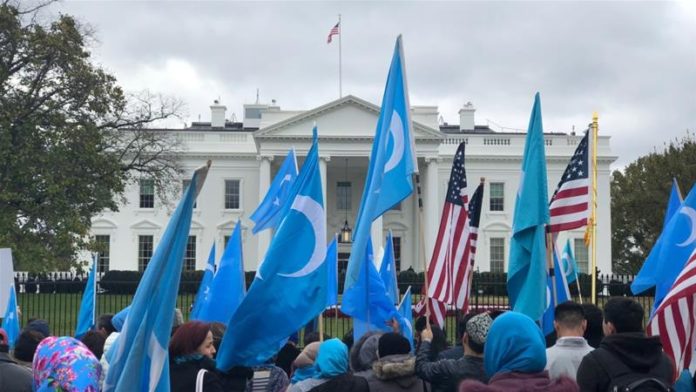COLUMN
Historically, Uyghurs created two East Turkistan Republics in 1933 and 1944 respectively, both of which were defeated in the end. However, the political goal of re-establishing these republics has never been stopped. This goal has gone through enormous challenges since the invasion of East Turkistan by the Chinese People’s Army because of a secret agreement between Stalin and Mao Zedong in 1949.
Chinese authorities have severely suppressed any idea and action related to Uyghur independence which would amount to the secession of the Uyghur nation from China. In the face of constant opposition from Chinese authorities on Uyghur nationalism, the Uyghur independence movement has largely gone underground, protecting itself from being crushed mercilessly. A lot of underground organizations have been created and operative inside and outside of East Turkistan since 1949.
Since the 1990s when the Chinese government launched a harsh crackdown on Uyghur nationalism which served as the spiritual fortress against China’s aggressive assimilation, the Uyghur independence movement moved out of China into Central Asian countries, Turkey and, finally, Europe and the US. This was a turning point in the internationalization of the Uyghur cause. However, the more internationalized it became, the more challenges it faced.
These challenges were both internal and external. Externally, Chinese security agencies have deeply infiltrated into the Uyghur communities in general and into Uyghur organizations, political or otherwise, all around the world. As a result, Uyghur political communities are pit against one another, without being able to form a global resistance front to China, falling prey to the subversive activities of Chinese spies who spread false rumors and change the perceptions of their goal, and to accept the image of China as invincible, etc. This has done huge damage to the delicate fabric of Uyghur communities needing to act in unison more than ever against China. Internally, sadly, the Uyghur independence movement has not been able to lay the theoretical foundations of East Turkistan independence as an ultimate political goal of Uyghurs. The unclarity of the goal has made the political views of Uyghurs full of confusion and chaos. The confusion stems from not knowing who the political enemy is and how to deal with them.
Lack of a unified political goal has left room for everybody to put forward his or her own political goal, pointing out who they believe is the real enemy. At times, this disunity has divided Uyghurs into many small political groups, vying for political power and engaging in unending conflict. For example, some Uyghur political leaders suggested that Pan Turkism or Pan Islamism be the ultimate goal of Uyghurs. Unrealistic and outdated, these isms have deviated the Uyghur resistance movement from its true path towards national liberation while throwing it deep into the pits of political chimeras and illusions.
To a certain extent, this is the successful work of Chinese intelligence services to influence the minds of Uyghur leaders, making them unable to think about their future realistically and strategically. In light of these isms, the goal of the Uyghur independence movement has been portrayed as either being too Pan Turkism-oriented or too Islamic. Both categorizations, despite being untrue, have not represented the genuine nature of the movement; instead, they have brought the movement closer to what China wants it to be portrayed as so that they can demonize the Uyghur resistance behind the veil of fighting terrorism.
On the other hand, China deliberately created the East Turkistan Islamic Movement in Pakistan as a shadowy organization to keep these political fantasies alive and convincing. Despite it being mostly unknown and inactive, it is used by China to paint Uyghur resistance with terrorism from time to time where needed. Unfortunately, the Uyghur public in exile, who have been subject to the brainwashing and psychological re-engineering operations of China for decades, have not been sensitive enough to see the danger in these tendencies. Moreover, the disunity among Uyghur diasporic communities, over which there is no unified political leadership to date, has made it impossible for them to choose the right goal. In particular, the lack of political experiences of the leaders of Uyghur organizations in exile is another contributing factor for not being able to lead the Uyghurs to choose the politically correct path.
I have been aware of the political games being played out by the Chinese government, since I went into exile during 1996 as a staunch Uyghur nationalist and experienced intellectual who aimed desperately to find a proper way to achieve the independence of East Turkistan. For this aim, I wrote a great number of critical political treatises with a focus on ideological issues, principal problems, and strategic shortcomings from which the Uyghur independence movement had been suffering over the past few decades. However, against my intention, these treatises have not drawn the sufficient interests of the public. Since 2017, I have turned to talk about these matters online in short and powerful video clips on YouTube, appealing to the broader public in a simple and persuasive language. These clips have suddenly got huge public attention, thanks to the intelligibility and urgency of the topics that I have addressed to the Uyghur audience in a systematic way with a sense of urgency. In those clips, I have reiterated the central matter in our independence movement with this slogan: “One Goal, One Enemy.” This slogan makes it a powerful message for the Uyghurs that we have only one goal to achieve, the independence of East Turkistan, and we have only one enemy to defeat, the Chinese colonial government in East Turkistan. By virtue of this slogan, I intended to put an end to the general and prolonged confusion over our goal and over our enemy. Furthermore, it politically rectified the previous mistakes, with an aim of avoiding the interference of the Chinese authorities to show us the wrong enemy and an unrealistic goal.
For example, since the Arab Spring movement in 2011, some Uyghur religious figures carried out a secret task given to them by the Chinese intelligence service to attract naïve Uyghur youth to go to Syria. As a result, tens of thousands of Uyghurs, unbelievably, got out of China, where everything was subject to strict restriction, into South East Asian countries, from where they moved further into Syria through Turkey, under the illusion that they finally escaped the control of the Chinese government. In Syria, they found themselves at the wrong place, at the wrong time, only for China to show them to the world that Uyghurs are terrorists. This dangerous allegation boosted China’s determination to eliminate Uyghurs in the name of fighting against Uyghur terrorism, leading up to the establishment of hundreds of concentration camps for Uyghurs altogether in 2018.
At the beginning, these Uyghur youth did not question the modus operandi of this heinous plan as they had little to no knowledge about how China’s propaganda worked and how espionage services used some religious forces to lure them into being caught in the line of terrorists. Nor did they question the possibility for them to get out of China, where they would need a travel document going from their village to a next village, into Syria through border areas between China and South East countries, including Vietnam, Laos, Burma, Malaysia and India—the areas that the Chinese patrol forces were highly visible, strict and effective.
On the other hand, if we look at some of the terrorist activities that were allegedly committed by Uyghurs, it becomes clear that they were planned by the Chinese intelligence services to put demonize the Uyghurs. Uyghurs cannot even purchase kitchen knives unless the knives are registered and barcoded and the person goes through a lengthy screening process. Under such circumstances, the use of knives for terrorist activities inside China incites deep suspicion. It is more likely that they were used by China to draw a false link between peaceful Uyghur grievances and terrorism. This false link is ultimately to justify the harsh crackdown on Uyghurs. Another example is that it is almost impossible for the Uyghurs to obtain materials to create a bomb since Chinese authorities do not allow Uyghurs to even purchase matches for fear that they will collect the oxidizing agents at the tips of the matches to make bombs. This makes it highly unlikely that Uyghurs could make bombs to carry out attacks on the Chinese. Therefore, all the terrorism allegations that Chinese government has made against Uyghurs is realistically untrustworthy and politically fabricated.
Currently, the East Turkistan Government in Exile is making great efforts to show Uyghur communities across the globe the right path to the goal of independence from China through the principle of “One Goal, One Enemy.” Uyghurs have gradually been accepting the fact that the East Turkistan Government in Exile represents the genuine interest of Uyghurs in the re-establishment of East Turkistan with the correct end goal and proper means to attain it. Meanwhile, the Government is also actively promoting grassroots activities among Uyghur communities to be united against China more urgently than ever.
(This article was written by the president of East Turkistan Government in-Exile Ghulam Osman)








